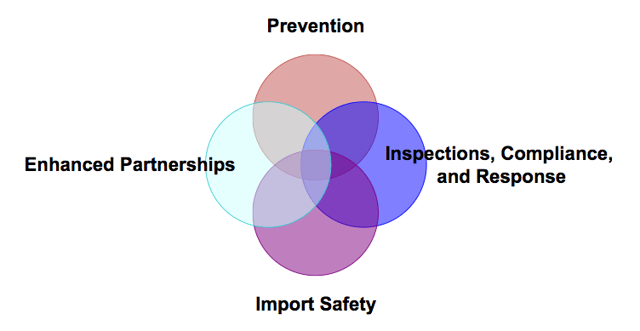Written by SmartSense | Food Safety, FSMA, Supply Chain
Key takeaways
When the Food Safety Modernization Act (FSMA) passed in 2011, it shifted U.S. food safety policy from a reactive afterthought to a proactive mission. That is, rather than responding to contamination after the fact, the law mandates preventing problems during manufacturing and transport before they occur. FSMA also provides the FDA with new enforcement authorities to achieve higher rates of compliance and tools to hold imported foods to the same standards as domestic foods. The goal of FSMA is to integrate local and state guidelines into a national food safety system that better protects public health and keeps consumers safe.
FSMA is an important new law for food safety and at first may not sound like it affects your restaurant. But, it has serious implications for restaurants regarding operations, quality, and overall safety.
Main Themes of FSMA

FSMA can best be understood as granting the FDA authoritative jurisdiction in the following areas:
Prevention
For the first time in its history, the FDA can require comprehensive preventative controls across the food supply chain, from farm to fork. These regulations include:
- Mandatory Control Programs: All food facilities must write and implement a plan to prevent contamination. This is important not only for manufacturers but for your establishment. A crucial control program to have in place in your restaurants is your HACCP Plan.
- Produce Safety Criteria: The FDA has established science-based, minimum standards for the safe production and harvesting of fruits and vegetables, which is important for manufacturers.
- Intentional Adulteration Standards: To protect against the intentional adulteration of food, the FDA has issued mitigation strategies to prepare and protect the food supply chain at specific vulnerable points. This mostly impacts suppliers, but if your restaurant is in charge of it’s own supply chain, this is an important standard to understand.
Inspection and Compliance
FSMA recognizes that without compliance, improved safety standards are only an empty promise. To ensure FSMA compliance, the new regulation requires the following updates:
- Mandated Inspection Frequency: FSMA requires regularly scheduled inspections of food facilities, as well as increased frequency for facilities based on their risk of contamination.
- Expanded Records Access: Food companies are required not only to write food safety plans, but also to keep up-to-date documentation of its implementation.
- Testing by Third Party Laboratories: FSMA requires specified food tests to be conducted at food establishments by accredited laboratories with high-quality benchmarks.
Response
To respond effectively when problems emerge despite preventative controls, the FDA now has tools to assert its regulatory authority, which focuses on manufacturers, including:
- Mandatory Recall: When a food company fails to voluntarily recall unsafe food after being asked to by the FDA. Be aware of recalled products, just in case you carry a product in your restaurant.
- Expanded Administrative Detention: When a food product is prevented from being transported because of potential violation of safety laws.
- Suspension of Registration: When a food facility is prohibited from distributing food because it poses a reasonable probability of serious adverse health consequences or death
Import Safety
FSMA gives the FDA unprecedented authority to better ensure that imported products meet U.S. standards and are safe for U.S. consumers. These rules are important to be aware of if you do your own importing. You should also ensure that your supplier is following these laws. New regulations via the FDA include:
- Importer Accountability: For the first time, importers have an explicit responsibility to verify that their foreign suppliers have adequate preventive controls in place to ensure that the food they produce is safe.
- Authority to Deny Entry: The FDA can refuse a product from entering the U.S. if the agency is denied access by a foreign country or facility.
Enhanced Partnerships
FSMA recognizes that domestic and foreign food safety agencies need to work together to achieve public health goals. The law demands a formal system of collaboration, including:
- Reliance on inspections by other agencies that meet standards
- Local, state, and international capacity building
- Improved foodborne illness surveillance
- National agriculture and food defense strategy
- Consortium of laboratory networks
Stay tuned for our posts on the Sanitary Transport Rule and Foreign Supplier Verification Program and how they impact your restaurant. For more in-depth details about FSMA, please visit the FDA website.
Other Suggested Posts
How Sales & Operations Planning Decisions Prevent Food Waste in the Supply Chain
Food waste along the wholesale and retail supply chain is often blamed on downstream operations failures. Its roots, however, oftentimes lie upstream. As we ...
How to Improve QSR Operations with IoT-Enabled Tools for Deskless Workers
As the demand for convenient, fast, and quality food continues to rise, small QSR chains face increasing pressure to deliver exceptional customer experiences ...
Why Customer Success Makes the Difference in Your Condition Monitoring Program
If your business objective is to implement an efficient and successful condition monitoring program, gone are the days of “set it and forget it.” Today’s savvy ...
Subscribe to the SmartSense Blog
Stay up-to-date on the evolution of IoT connectivity.



